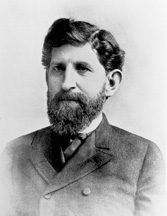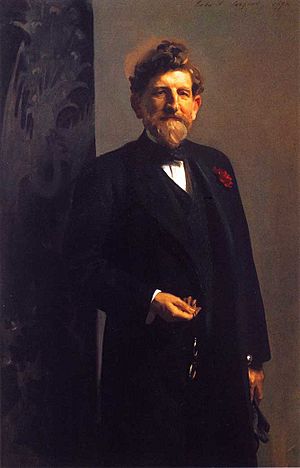Calvin S. Brice facts for kids
Quick facts for kids
Calvin Brice
|
|
|---|---|
 |
|
| United States Senator from Ohio |
|
| In office March 4, 1891 – March 3, 1897 |
|
| Preceded by | Henry B. Payne |
| Succeeded by | Joseph B. Foraker |
| Chair of the Democratic National Committee | |
| In office 1889–1892 |
|
| Preceded by | William Barnum |
| Succeeded by | William F. Harrity |
| Personal details | |
| Born |
Calvin Stewart Brice
September 17, 1845 Denmark, Ohio, U.S. |
| Died | December 15, 1898 (aged 53) New York City, New York, U.S. |
| Political party | Democratic |
| Education | Miami University, Oxford (BA) University of Michigan |
| Signature | |
Calvin Stewart Brice (born September 17, 1845 – died December 15, 1898) was an American businessman and a Democratic politician from Ohio. He is known for serving one term as a United States Senator, leading the Democratic National Committee, and playing a big part in building America's railroad system.
Contents
Early Life and Education
Calvin Brice was born on September 17, 1845, in Denmark, Ohio. His father, William Kirkpatrick Brice, was a Presbyterian minister. Calvin was taught at home for a while. Later, he went to public school in Putnam County, Ohio.
In 1859, Calvin was accepted into Miami University. He tried to join the army in 1861 but was too young. In 1862, he joined the 86th Ohio Infantry and served for three months. He saw action in West Virginia.
After graduating from Miami University with high honors in 1863, he worked as a school teacher. In 1864, he joined the army again. This time, he was a captain leading a group of volunteers for the 180th Ohio Infantry. Calvin quickly moved up the ranks in the Union Army. By the end of the war, he was a Lieutenant-Colonel.
After the war, Brice decided not to stay in the army. He wanted to become a lawyer. He earned his law degree from the University of Michigan Law School in 1865. He passed the Ohio bar exam in 1866.
Building a Business Empire
Calvin Brice started his business and political journey in an interesting way. Around 1880, his law practice wasn't doing well. His mother's home was also at risk. He offered to help the person who held the mortgage, who was then-Governor Charles Foster.
Governor Foster didn't need legal help. Instead, he offered Brice $500 to make a business deal in Wall Street. Brice accepted. He was very smart and didn't follow Foster's exact instructions. Instead, he trusted his own ideas. He returned with a surprising profit of $40,000. This earned him Governor Foster's trust and friendship. Foster later called Brice "the most remarkable man" he had ever met.
Throughout his business career, Brice was known for two things. First, he could fix struggling businesses and make them profitable. Second, he always had the support of Charles Foster, which was very important for his success.
Railroad Builder
Brice first learned about the railroad industry at the Lake Erie and Louisville Railroad. He learned how to run, fund, and expand a train network. In 1871, he went to Europe to get money for a struggling railway in Ohio. He impressed Governor Foster again.
With Foster's help, Brice guided the railroad through a tough economic time called the Panic of 1873. He also expanded it into Lima, Ohio and nearby areas. One of his biggest achievements was helping to build the Nickel Plate Road in 1882. This railroad ran from New York to St. Louis. He later sold it for a good profit to William Henry Vanderbilt.
By 1887, Brice became the President of the company, which was then called the Lake Erie and Western Railroad. Over time, he became very wealthy. He owned parts of ten different railroads. He also got involved in other businesses, like the National Telegraph Company and the Chase National Bank in New York.
Later in his life, Brice worked on railroad projects in China. He helped create the American Asiatic Association. This group worked to improve American trade in China. In the late 1890s, he started building a railroad between Canton and Hankou in China. However, he passed away before the project was finished.
Brice was known for being fair and not overly greedy in his business dealings. He didn't take too much money for his services. He also made sure his business plans were clear for everyone to see.
Political Career

While building his business, Calvin Brice also became more involved in politics. He started as an elector for Samuel J. Tilden in 1876. Later, he worked on Grover Cleveland's successful presidential campaign in 1884.
Leading the Democratic Party
After Cleveland became president, Brice became more active in the Democratic Party. In 1888, he was chosen as a delegate for the Democratic National Convention. In 1889, Brice was picked to lead the Democratic National Committee (DNC). The DNC is a group that helps run the Democratic Party.
Because he was wealthy and had many connections, Brice was a very powerful party leader. People even called him "Calvin $ellars Brice." He served as chairman until 1892. He was replaced by William Harrity.
Serving as U.S. Senator
In 1890, Brice was chosen by his party to become the next U.S. Senator from Ohio. A U.S. Senator helps make laws for the country. Some media criticized him, saying he didn't really live in Ohio anymore. He had lived in New York for several years.
Brice spent a lot of money on his campaign. This helped the Democratic Party win more seats in the Ohio General Assembly. This allowed Brice to be chosen as Senator. The Senate looked closely at his election because of some unusual things that happened with the previous Senator's selection.
As a Senator, Brice didn't pass many famous laws. However, he was known as a hard-working and smart member. He led the Committee on Pacific Railroads. He was also a member of the Democratic Steering Committee and the Committee on Appropriations.
Brice changed his mind on an important issue called "tariff reform." This made many of his Democratic supporters unhappy. Because he had strong ties to New York businesses, some people in Ohio called him "New York's Third Senator." Even though he avoided being officially criticized by his party in 1894, he lost his bid for reelection three years later. He was defeated by Republican Joseph B. Foraker. After this loss, Brice stopped being involved in Ohio politics.
Death
Calvin Brice died suddenly in New York City on December 15, 1898. He passed away from a severe case of pneumonia.
Legacy
The mining town of Briceville, Tennessee, is named after him. He was very important in helping connect the town to railroad service.
Brice was also very dedicated to Miami University. In 1885 and 1888, his efforts to get money for the University helped it survive. A science building, Brice Hall, was named in his honor. That building has since been taken down.
See also
- New York, Chicago and St. Louis Railroad
- List of United States senators from Ohio
- Briceville, Tennessee

